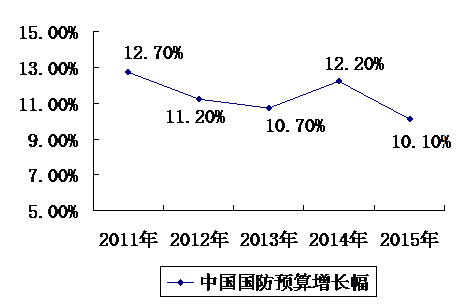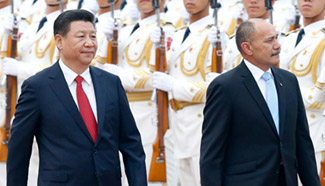????On March 5, China’s Ministry of Finance tendered the draft of this year’s central and local government budget to the National People’s Congress (NPC), China’s top legislature, for review. According to the draft, China’s defense budget will grow 10.1 percent this year to 886.898 billion yuan, compared with a 12.2-percent increase in 2014. This represents the slowest growth in China’s military spending in the past five years. Lawmakers approved the draft, including its target for military spending, on March 15.
????“Increasing the defense budget is essential to accomplish our national security and military strategy. This budget makes sure we meet our military targets and is indispensible in boosting national defense,” said Chen Zhou, a research fellow at the Academy of Military Sciences under the People’s Liberation Army (PLA) and an NPC deputy.

????Growth in the defense budget in past 5 years (annual defense budget growth)
????That budget places China in a distant second place in military spending after the United States, whose spending outstrips the total of 14 countries after it combined.
????China’s military spending should also be viewed in light of the exchange rate. Each country’s spending is measured in its local currency, but is usually reported by media in dollar terms for more straightforward comparison. However, the Chinese yuan has gained nearly 8 percent against the U.S. dollar since 2010, a factor that could make China’s defense budget higher in dollar terms.
????Ratio to GDP still low Defense spending as a share of GDP shows a country’s level of militarization. The more a country spends on the military, the less it will on spend areas such as infrastructure and education. An internationally accepted standard places military spending at 2 percent of GDP. The United Kingdom and France’s military spending has been around 2 percent of their GDP for years. But for Russia and the U.S., the ratio is up to 4 percent.
????Last year, China spent 808.23 billion yuan on the military, or 1.3 percent of its GDP, far below that of the U.S. and Russia and still within the 2-percent threshold. Even Japan, which was forced to demilitarize after World War II, has spent more than 1 percent of its GDP on defense. Factoring defense budget as a share of fiscal spending, China comes in at 6 percent, compared with an average of 9.86 percent among major countries in the world.
????At the NPC press conference on March 4, spokeswoman Fu Ying said lawmakers and the Chinese people were supportive of increasing military spending. Indeed, the Chinese understand the defense landscape facing their country has grown very complicated over the years. National security encompasses more than ever. The challenges for maintaining national unity, sovereign integrity, protecting marine rights and development interests are mounting. It has become an over-reaching effort that deals with interweaving intricacies among different players, rising tensions over territorial claims and maritime interests. It also involves competing geopolitical strategies among major powers amid the expansion of terrorism, separatism and extremism.
????China has never denied the fact that its defense spending, which has grown at a very fast clip, has been the second largest in the world for years. But few would agree that the world’s second largest economy enjoys the same status in security. In fact, China wouldn’t even make the list of the world’s four most secure countries. Given the complicated nature of geopolitical factors facing China, it is unrealistic to seek protection from other countries. That said, boosting its military strength is the only way to keep China secure and its legitimate interests intact.
????New spending to pay old bills Although China’s defense budget has grown rapidly over the years, it should be noted that it is growing from a very low base and the increase over the years has been used to pay old bills.
????The biannual defense white paper offers the most definitive explanation of how China’s military budget is spent. The stipend for military personnel, training and equipment are among the major items of military spending and these three items have been underfunded for years.










